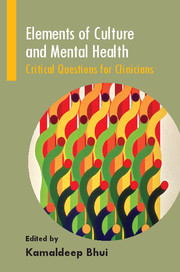Book contents
- Frontmatter
- Contents
- List of contributors
- Foreword: Desire and commitment: essential ingredients in learning about culture and mental illness
- 1 Is trauma-focused therapy helpful for survivors of war and conflict?
- 2 Will ethnopsychopharmacology lead to changes in clinical practice?
- 3 Does cognitive–behavioural therapy work for people with very different cultural orientations and backgrounds?
- 4 Can you do meaningful cognitive–behavioural therapy through an interpreter?
- 5 Are particular psychotherapeutic orientations indicated with specific ethnic minority groups?
- 6 Can psychotherapeutic interventions overcome epistemic difference?
- 7 On the role of culture and difference in evaluation, assessment and diagnosis
- 8 Necessary and sufficient competencies for intercultural work
- 9 On the validity and usefulness of existing Eurocentric diagnostic categories
- 10 Benefits and limitations of the cultural formulation in intercultural work
- 11 Barriers to the intercultural therapeutic relationship and how to overcome them
- 12 How does intercultural interpretation work in the mental health setting?
- 13 Do the power relations inherent in medical systems help or hinder in cross-cultural psychiatry?
- 14 Recovery and well-being: a paradigm for care
- 15 Social perspectives on diagnosis
- 16 Public mental health and inequalities
- 17 Can you do psychotherapy through an interpreter?
- 18 Can race and racism be acknowledged in the transference without it becoming a source of therapeutic impasse?
- 19 Cultural competence: models, measures and movements
- 20 Religion, spirituality and mental health
- Index
13 - Do the power relations inherent in medical systems help or hinder in cross-cultural psychiatry?
Published online by Cambridge University Press: 01 January 2018
- Frontmatter
- Contents
- List of contributors
- Foreword: Desire and commitment: essential ingredients in learning about culture and mental illness
- 1 Is trauma-focused therapy helpful for survivors of war and conflict?
- 2 Will ethnopsychopharmacology lead to changes in clinical practice?
- 3 Does cognitive–behavioural therapy work for people with very different cultural orientations and backgrounds?
- 4 Can you do meaningful cognitive–behavioural therapy through an interpreter?
- 5 Are particular psychotherapeutic orientations indicated with specific ethnic minority groups?
- 6 Can psychotherapeutic interventions overcome epistemic difference?
- 7 On the role of culture and difference in evaluation, assessment and diagnosis
- 8 Necessary and sufficient competencies for intercultural work
- 9 On the validity and usefulness of existing Eurocentric diagnostic categories
- 10 Benefits and limitations of the cultural formulation in intercultural work
- 11 Barriers to the intercultural therapeutic relationship and how to overcome them
- 12 How does intercultural interpretation work in the mental health setting?
- 13 Do the power relations inherent in medical systems help or hinder in cross-cultural psychiatry?
- 14 Recovery and well-being: a paradigm for care
- 15 Social perspectives on diagnosis
- 16 Public mental health and inequalities
- 17 Can you do psychotherapy through an interpreter?
- 18 Can race and racism be acknowledged in the transference without it becoming a source of therapeutic impasse?
- 19 Cultural competence: models, measures and movements
- 20 Religion, spirituality and mental health
- Index
Summary
Power relations are a structural characteristic of all social relationships, organisational systems and societies as a whole (Proctor, 2002; Dalal, 2003). Certain identities are accorded different powers and status depending on who they are as people (societal, personal and historic power) and the position they hold within a hierarchical institution or work setting (role-power; authority). In medicine, doctors (because of their education, training, experience and expertise) have the authority to diagnose and treat those they deem to be ill, with clear boundaries, systems of accountability and opportunities for others to challenge those decisions if there are breaches of a doctor's defined roles. Less obvious perhaps is the societal, personal and historic powers exerted (often unwittingly) by doctors’ values, biases and assumptions about their patients, since subjectivity is part of the clinical task. These informal values and systemic biases are not easy to identify, not necessarily limited by any formal boundaries and have no regulated system of accountability, leaving their influence to the discretion of each individual clinician. This source of influence and power is of particular significance in psychiatry, where diagnosis and treatment are determined not by an objective measurement or scientific test or biomarker, but rather by professional judgements that make positive and creative use of subjectivity (Loring & Powell, 1988; Fernando, 2010).
Psychiatry is firmly located within medical systems of authority, developed (at least initially) within Western (Euro–American, industrialised and high-income) countries and cultures; within these cultures, doctors were allocated the authority to name problematic thoughts, feelings and behaviours as illness of the mind (see Chapter 14, this volume). However, aspects of these problematic thoughts, feelings and behaviours are culturally determined and they may fall outside psychiatry's Eurocentric frame of reference. They may, however, be acceptable within their relevant cultural contexts. In such situations, misunderstandings can easily occur when psychiatrists (wittingly or unwittingly) use not only authority but also power in a way that is at least partially determined by their personal values and biases to inform diagnosis, risk assessment, treatment and management (Loring & Powell, 1988).
- Type
- Chapter
- Information
- Elements of Culture and Mental HealthCritical Questions for Clinicians, pp. 61 - 64Publisher: Royal College of PsychiatristsPrint publication year: 2013

